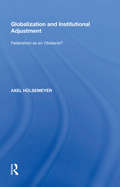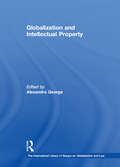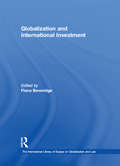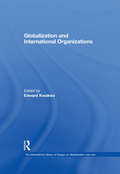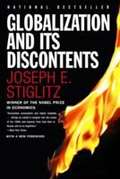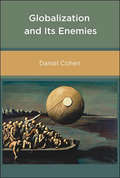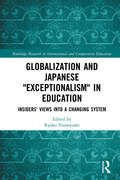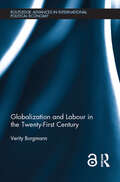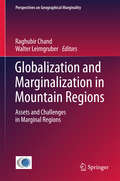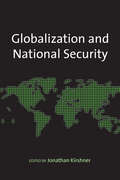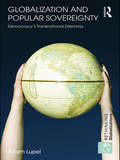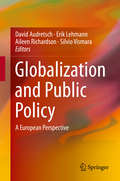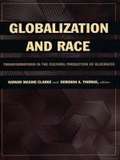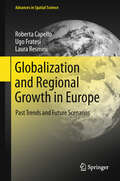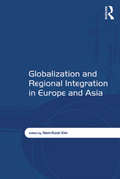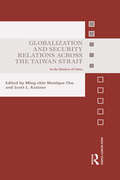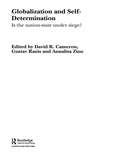- Table View
- List View
Globalization and Institutional Adjustment: Federalism as an Obstacle?
by Axel H�lsemeyerCombining the disciplines of international political economy, public sector economics and comparative politics, this stimulating book debates whether federalism obstructs institutional adjustment under conditions of a globalized economy, or whether this depends upon the extent to which a given political system is centralized. Axel Hülsemeyer analyzes the ratification of the Single European Act and the Maastricht Treaty, and contrasts these with the implementation of the bilateral free trade agreement between the United States and Canada as well as the NAFTA. Preferential trade agreements themselves are conceptualized as the state response to economic globalization.
Globalization and Intellectual Property (The International Library of Essays on Globalization and Law)
by Alexandra GeorgeIntellectual property laws have become intricately entwined with discussions about globalization. This volume deals with the politics, economics and effects of global intellectual propertization. It provides essays covering key issues including the international relations of global intellectual propertization, the TRIPS Agreement and the tying of intellectual property issues to international trade negotiations, contentions that global intellectual propertization is a form of post-colonial neo-imperialism, globalization's effects on intellectual property law's classic doctrines and rationales and the cultural effects of global intellectual propertization.
Globalization and International Investment (The International Library of Essays on Globalization and Law)
by Fiona BeveridgeThis volume brings together a broad range of articles on international law and foreign investment which together provide a contemporary overview of the diverse range of issues and perspectives which continue to exercise policy-makers and scholars alike. Central to this collection is the tension between market-oriented reforms on the one hand, raising issues of market access and protection of investors, and corporate social responsibility discourses on the other, raising concerns about environmental protection and respect for human and labour rights. Regional perspectives on these issues reveal differing priorities and approaches.
Globalization and International Organizations (The International Library of Essays on Globalization and Law)
by Edward KwakwaThe last few years have witnessed several significant developments in respect of international organizations, most of which are best encapsulated in the word "change". In particular, international organizations have moved from their traditional role of facilitator of the activities of their members, to that of director of their own activities. As a result, there is increased scrutiny over issues relating to the governance, control, accountability and the privileges and immunities of international organizations. These subjects are all the focus of this book. Edward Kwakwa has collected together the best published work by leading authorities in the field on subjects of crucial importance and relevance to international organizations, particularly in the context of today's ever-increasing globalization. This book is of interest to scholars and students of law, as well as government and non-government practitioners and international civil servants.
Globalization and Its Discontents
by Joseph E. StilgitzWhen it was first published, this national bestseller quickly became a touchstone in the globalization debate. Renowned economist and Nobel Prize winner Joseph E. Stiglitz had a ringside seat for most of the major economic events of the last decade, including stints as chairman of the Council of Economic Advisers and chief economist at the World Bank. Particularly concerned with the plight of the developing nations, he became increasingly disillusioned as he saw the International Monetary Fund and other major institutions put the interests of Wall Street and the financial community ahead of the poorer nations. Those seeking to understand why globalization has engendered the hostility of protesters in Seattle and Genoa will find the reasons here. While this book includes no simple formula on how to make globalization work, Stiglitz provides a reform agenda that will provoke debate for years to come. Rarely do we get such an insider's analysis of the major institutions of globalization as in this penetrating book. A new foreword for this edition.
Globalization and Its Enemies
by Daniel CohenThe enemies of globalization--whether they denounce the exploitation of poor countries by rich ones or the imposition of Western values on traditional cultures--see the new world economy as forcing a system on people who do not want it. But the truth of the matter, writes Daniel Cohen in this provocative book, may be the reverse. Globalization, thanks to the speed of twenty-first-century communications, shows people a world of material prosperity that they dowant--a vivid world of promises that have yet to be fulfilled. For the most impoverished developing nations, globalization remains only an elusive image, a fleeting mirage. Never before, Cohen says, have the means of communication--the media--created such a global consciousness, and never have economic forces lagged so far behind expectations. For the poorest countries of the world, writes Cohen, the problem is not so much that they are exploited by globalization as that they are forgotten and excluded.
Globalization and Its Enemies
by Daniel CohenA provocative argument that the frustrations of globalization stem from the gap between the expectations created and the lagging economic reality in poor countries.The enemies of globalization—whether they denounce the exploitation of poor countries by rich ones or the imposition of Western values on traditional cultures—see the new world economy as forcing a system on people who do not want it. But the truth of the matter, writes Daniel Cohen in this provocative account, may be the reverse. Globalization, thanks to the speed of twenty-first-century communications, shows people a world of material prosperity that they do want—a vivid world of promises that have yet to be fulfilled. For the most impoverished developing nations, globalization remains only an elusive image, a fleeting mirage. Never before, Cohen says, have the means of communication—the media—created such a global consciousness, and never have economic forces lagged so far behind expectations. Today's globalization, Cohen argues, is the third act in a history that began with the Spanish Conquistadors in the sixteenth century and continued with Great Britain's nineteenth-century empire of free trade. In the nineteenth century, as in the twenty-first, a revolution in transportation and communication did not promote widespread wealth but favored polarization. India, a part of the British empire, was just as poor in 1913 as it was in 1820. Will today's information economy do better in disseminating wealth than the telegraph did two centuries ago? Presumably yes, if one gauges the outcome from China's perspective; surely not, if Africa's experience is a guide. At any rate, poor countries require much effort and investment to become players in the global game. The view that technologies and world trade bring wealth by themselves is no more true today than it was two centuries ago. We should not, Cohen writes, consider globalization as an accomplished fact. It is because of what has yet to happen—the unfulfilled promises of prosperity—that globalization has so many enemies in the contemporary world. For the poorest countries of the world, the problem is not so much that they are exploited by globalization as that they are forgotten and excluded.
Globalization and Japanese Exceptionalism in Education: Insiders' Views into a Changing System (Routledge Research in International and Comparative Education)
by Ryoko TsuneyoshiGlobalization is the most common overriding characteristic of our time, with societies all over the world struggling to change their educational systems to meet what are perceived to be the needs of globalization. This book provides an insider's account of how the Japanese educational system is trying to meet that challenge while placing the developments in a larger international context. Distinguishing itself from other books in the same genre, this volume (1) brings in the diversity of insiders‘ reactions concerning globalization reform in education, while placing such actions in the larger international context, and (2) covers a wide span of education (elementary to higher education) and shows how the globalization reforms as a whole are affecting Japanese education. With a focus on insiders’ accounts, this book brings in information that is little known outside of Japan. It also links globalization processes in Japanese society, school education and higher education, accounting for similarities and differences across educational levels, providing insight into the multifaceted processes affecting the Japanese education system. Chapters include: From High School Abroad to College in Japan: The Difficulties of the Japanese Returnee Experience The University of Tokyo PEAK Program: Venues into the Challenges Faced by Japanese Universities Why Does Cultural Diversity Matter? Korean Higher Education in Comparative Perspective
Globalization and Labour in China and India
by Paul Bowles John HarrissGlobalization has pushed China and India to the centre of the stage but what has been the impact on workers in these countries? This book demonstrates the complexity of the processes and responses at play. There are signs that both states are shifting their role in a 'counter movement from above'. But will this be enough to quell the social unrest?
Globalization and Labour in the Twenty-First Century (Routledge Advances in International Political Economy)
by Verity BurgmannThe Open Access version of this book, available at http://www.tandfebooks.com, has been made available under a Creative Commons Attribution-Non Commercial-No Derivatives 3.0 license.Globalization has adversely affected working-class organization and mobilization, increasing inequality by redistribution upwards from labour to capital. However, workers around the world are challenging their increased exploitation by globalizing corporations. In developed countries, many unions are transforming themselves to confront employer power in ways more appropriate to contemporary circumstances; in developing countries, militant new labour movements are emerging. Drawing upon insights in anti-determinist Marxian perspectives, Verity Burgmann shows how working-class resistance is not futile, as protagonists of globalization often claim. She identifies eight characteristics of globalization harmful to workers and describes and analyses how they have responded collectively to these problems since 1990 and especially this century. With case studies from around the world, including Greece since 2008, she pays particular attention to new types of labour movement organization and mobilization that are not simply defensive reactions but are offensive and innovative responses that compel corporations or political institutions to change. Aging and less agile manifestations of the labour movement decline while new expressions of working-class organization and mobilization arise to better battle with corporate globalization. This book will be of interest to students and scholars of labour studies, globalization, political economy, Marxism and sociology of work.
Globalization and Latin American Cinema: Towards A New Critical Paradigm (Palgrave Studies in Globalization, Culture and Society)
by Sophia A. McClennenStudying the case of Latin American cinema, this book analyzes one of the most public - and most exportable- forms of postcolonial national culture to argue that millennial era globalization demands entirely new frameworks for thinking about the relationship between politics, culture, and economic policies. Concerns that globalization would bring the downfall of national culture were common in the 1990s as economies across the globe began implementing neoliberal, free market policies and abolishing state protections for culture industries. Simultaneously, new technologies and the increased mobility of people and information caused others to see globalization as an era of heightened connectivity and progressive contact. Twenty-five years later, we are now able to examine the actual impact of globalization on local and regional cultures, especially those of postcolonial societies. Tracing the full life-cycle of films and studying blockbusters like City of God, Motorcycle Diaries, and Children of Men this book argues that neoliberal globalization has created a highly ambivalent space for cultural expression, one willing to market against itself as long as the stories sell. The result is an innovative and ground-breaking text suited to scholars interested in globalization studies, Latin-American studies and film studies.
Globalization and Marginalization in Mountain Regions
by Raghubir Chand Walter LeimgruberThis book looks at the global importance of mountain systems, emphasizing their ecological and socio-economic role in light of climate change and globalization. With a special focus on the Himalayas, it also examines the Czech-German-Austrian mountain borderland, the Alps, the Andes, the highland regions of Malaysia, and the Arctic. The contributors, specialists in their fields, all use an integrative approach that develops and argues the concept of mountain regions as a global common good. Readers also discover that mountain systems and mountain communities are often marginalized and left behind by the process of globalization. Case studies throughout detail the effects of climate change and global warming on both nature and local/regional societies, such as declining water supplies, a shifting vegetation line, and other important issues facing not only mountains but also the vast regions depending on them. In addition, the comprehensive coverage offers authenticated viewpoints from some of the most eminent explorers of Tibet in the nineteenth century. More than 50 percent of the global human population draws benefits directly or indirectly from mountain resources and services. This book provides practitioners, researchers, students, and other interested readers with a compelling look at the global importance of this imposing, yet sensitive ecosystem.
Globalization and Mass Politics
by Timothy HellwigThis book analyzes how increases in international trade, finance, and production have altered voter decisions, political party positions, and the types of public issues that parties focus on in postindustrial democracies. Although many studies interrogate whether internationalization matters in regard to policy outcomes and how globalization relates to mass protest, few examine globalization and mass politics more generally. This book argues that by reducing the room in which to maneuver in policy making, globalization reduces the importance of economic-based issues while increasing the electoral importance of non-economic issues. The argument is tested on original and existing data sources.
Globalization and Military Power in the Andes
by William AvilésThrough a series of comparative case studies, the author demonstrates that the conflicts and struggles over capitalist globalization in the Andes are intricately connected to the political power of the military in the region.
Globalization and National Security
by Jonathan KirshnerIn this book, top scholars of international relations assess the consequences of globalization for national security, identifying three distinct ‘processes’ of globalization - the intensification of economic exchange, the flow of information, and marketization (the expansion of the set of social relations governed by market forces)-exploring how they can affect the capacity and power of states as well as conflict within and among them. Though much has been written on the topics of globalization and national security, there has been relatively little in the way of a systematic examination of the impact that globalization has on a state's national security. These essays deal with how state-less actors, such as terrorists, utilize the benefits of globalization, changing the nature of the security game. Failure to account for the influence of globalization will make it increasingly difficult to understand changes in the balance of power, prospects for war, and strategic choices embraced by states.
Globalization and Networked Societies: Urban Regional Change in Pacific Asia
by Yue-Man YeungGlobalization, along with globalism, continues its unrelenting and accelerating march as it draws more countries, cities, and people closer into interdependent relationships. Globalization and Networked Societies attempts to tease out some of the salient elements of this process, especially as it has affected urban centers in Pacific Asia over the past twenty years.
Globalization and Politics: Promises and Dangers
by Jan-Erik LaneGlobalization and Politics brings together vision and imaginative insight to the analysis of the evolution of inter-state politics to produce a clear, comprehensive and coherent sense of how globalization works and how it might work better. The study looks upon globalization as a distinct set of phenomena - energy, economy, environment and politics - all of which interact. Presenting opportunities for interdependency and governance, globalization offers both dangers and promises which explains why it is equally feared and praised. Globalization is an economic trend with strong spillovers and as such has become a political trend with cultural implications. This volume is an invaluable, highly readable new text for graduate and undergraduate courses. It sets out the key challenges for globalization in the 21st century and looks at the challenges, responses and risks of globalization. It is required reading for analysts, students and professionals who want to understand what's at stake in the globalization debate.
Globalization and Popular Sovereignty: Democracy’s Transnational Dilemma (Rethinking Globalizations Ser. #20)
by Adam LupelThis volume analyzes the impact of globalization on the concept of popular sovereignty and rethinks it for the transnational domain. It explores how popular sovereignty has historically determined the form of democratic citizenship and how democratic citizenship and legitimacy can be conceived in the transnational sphere in the absence of a global sovereign order. By inquiring into the new global context of popular sovereignty, the book seeks to better understand the emerging structures of global governance and their potential for democratic legitimacy. Lupel argues: That the challenges of globalization necessitate a rethinking of the concept of popular sovereignty beyond the domain of the nation-state That such a rethinking reveals a tension between the particularism of democratic legitimacy and the universalism of cosmopolitan politics Critical attention to the constitutive processes of global governance must become an integral part of democratic theory in the context of globalization; and a transnational model of popular sovereignty provides the best resources for this purpose. This book will be of interest to students and scholars of globalization, democratic theory and international relations theory.
Globalization and Public Policy
by Silvio Vismara David Audretsch Erik Lehmann Aileen RichardsonThis volume of selected articles was released in light of the new economic, social and environmental challenges Europe and the United States have been faced with following the end of the Cold War and in the evolving era of globalization. National security, immigration, and the provision of health and other key social services call for a radically different outlook in terms of policy discussions. The contributors of this book focus on seven key policy issues and challenges that currently affect the United States and Europe: income distribution, the gender pay gap, crime and security, unemployment, health care, the demographic question, and environmental regulation. The purpose of this volume is to analyze how public policy within the European context is responding to the challenges posed by this new global era.
Globalization and Race: Transformations in the Cultural Production of Blackness
by Kamari Maxine Clarke Deborah A. ThomasKamari Maxine Clarke and Deborah A. Thomas argue that a firm grasp of globalization requires an understanding of how race has constituted, and been constituted by, global transformations. Focusing attention on race as an analytic category, this state-of-the-art collection of essays explores the changing meanings of blackness in the context of globalization. It illuminates the connections between contemporary global processes of racialization and transnational circulations set in motion by imperialism and slavery; between popular culture and global conceptions of blackness; and between the work of anthropologists, policymakers, religious revivalists, and activists and the solidification and globalization of racial categories.A number of the essays bring to light the formative but not unproblematic influence of African American identity on other populations within the black diaspora. Among these are an examination of the impact of "black America" on racial identity and politics in mid-twentieth-century Liverpool and an inquiry into the distinctive experiences of blacks in Canada. Contributors investigate concepts of race and space in early-twenty-first century Harlem, the experiences of trafficked Nigerian sex workers in Italy, and the persistence of race in the purportedly non-racial language of the "New South Africa." They highlight how blackness is consumed and expressed in Cuban timba music, in West Indian adolescent girls' fascination with Buffy the Vampire Slayer, and in the incorporation of American rap music into black London culture. Connecting race to ethnicity, gender, sexuality, nationality, and religion, these essays reveal how new class economies, ideologies of belonging, and constructions of social difference are emerging from ongoing global transformations.Contributors. Robert L. Adams, Lee D. Baker, Jacqueline Nassy Brown, Tina M. Campt, Kamari Maxine Clarke, Raymond Codrington, Grant Farred, Kesha Fikes, Isar Godreau, Ariana Hernandez-Reguant, Jayne O. Ifekwunigwe, John L. Jackson Jr., Oneka LaBennett, Naomi Pabst, Lena Sawyer, Deborah A. Thomas
Globalization and Regional Growth in Europe
by Laura Resmini Roberta Capello Ugo FratesiAfter a description of the new forms of globalization currently shaping our world, and of their possible spatial effects, the book highlights which European regions have in the past succeeded in taking advantage of globalization trends and identifies the major reasons for their success. The book also offers a prospective analysis utilizing scenarios based on different assumptions of how globalization trends will develop, identifying the regional winners and losers for each scenario. The analysis greatly benefits from a unique database which contains, among others, data on FDI by sector and professions at the regional Nuts-2 level for all 27 EU countries. A time-span of more than 10 years is covered, and scenarios are developed for the future development up to 2020.
Globalization and Regional Integration in Europe and Asia
by Nam-Kook KimThis volume discusses the current trend of globalization and the main characteristics of world order, focusing specifically on the destiny of the nation state, the threat against human rights, and conflicts between unilateral hegemony of the USA and Europe. It examines the contemporary European experience and compares it with Asian reality with a view to implications for the future development of Asia. It also discusses regional integration as a framework for bringing stable peace, exploring detailed principles and specific forms of a regional community in Asia. Contributors from Europe and Asia critically review previous literature on this topic and suggest new theoretical and empirical grounds of regional community in Asia. The book takes the viewpoint of comparative civilization and experiences of European integration to offer meaningful lessons for the future of nation states and the possibility of building regional communities in Asia.
Globalization and Religious Nationalism in India: The Search for Ontological Security (Routledge Advances in International Relations and Global Politics #Vol. 46)
by Catarina KinnvallExploring the effects of globalization in India and the problem of identity formation, this book contributes to the theoretical and empirical debate on identity, globalization, religious nationalism and (in)security. The author puts forward a new approach based on political psychology, to interpret identity construction, which is seen as an individualized process where interactions of the global and the local are intimately implicated. Thereby, this book presents a psychological analysis of how increased insecurity affects individuals’ and groups’ attachments to religious nationalism in an era of globalization. Developing an interesting angle on a recognized issue of concern in the politics of South Asia, and much more broadly in the context of the contemporary world and developing global politics, this is a valuable addition to normative critical social theory and the debate on identity and culture in political science and international relations, appealing to an inter-disciplinary audience.
Globalization and Security Relations across the Taiwan Strait: In the shadow of China (Asian Security Studies)
by Scott L. Kastner Ming-chin Monique ChuThis book presents an interdisciplinary examination of cross-Taiwan Strait relations and the complex dynamics at play in the region. Since the election of Ma Ying-jeou as Taiwan’s president in 2008, the relationship across the Taiwan Strait—long viewed as one of Asia’s most volatile potential flashpoints—has experienced a remarkable détente. Whether the relationship has been truly transformed, however, remains an open question and the Taiwan Strait remains a central regional and global security issue. A return to turbulence in the Taiwan Strait could also add a new dimension of instability in the already tense maritime disputes in the East and South China Seas. While the relationship across the Taiwan Strait remains critically important, it is also changing rapidly, and the chapters in this volume present new thinking to help make sense of complex cross-Strait dynamics. Specifically, these essays explore different security and/or globalization dimensions of China-Taiwan ties as well as the globalization-security linkages that have emerged. As the balance of power in Asia shifts dramatically, several chapters in this volume explore how traditional security forces are evolving. At the same time, there are new dynamics emerging as a consequence of globalization forces, such as the tremendous economic and social integration across the Taiwan Strait, and several chapters in this volume consider some of these new problems. Finally, several chapters consider the often under-researched dynamics associated with the globalization/security interface such as cyber threats, transnational criminal networks and the security spill-over impact of production globalization. This book will of much interest to students of Chinese Politics, Asian Security, globalisation, diplomacy and International Relations.
Globalization and Self-Determination: Is the Nation-State Under Siege? (Routledge Studies in the Modern World Economy #Vol. 58)
by Gustav Ranis David R. Cameron Annalisa ZinnIs the nation state under siege? A common answer is that globalization poses two fundamental threats to state sovereignty. The first concerns the unleashing of centrifugal and centripetal forces - such as increasing market integration and the activities of institutions like the IMF, World Bank, and WTO - that imperil state sovereignty from 'outside' the nation state. The second threat emanates from self-determination movements that jeopardize state sovereignty from 'inside'. Rigorously analyzing popular hypotheses on globalization's effect on state sovereignty from a broad social sciences perspective, the authors use empirical evidence to suggest that globalization's multilevel threats to state sovereignty have been overestimated. In most instances globalization is likely to generate pressure for increased government spending while only one form of market integration - foreign direct investment by multinational enterprises - appears to increase any feeling of economic insecurity. This volume will be invaluable to course instructors at both graduate and undergraduate levels, policy makers and members of the general public who are concerned about the effects of globalization on the nation-state.
